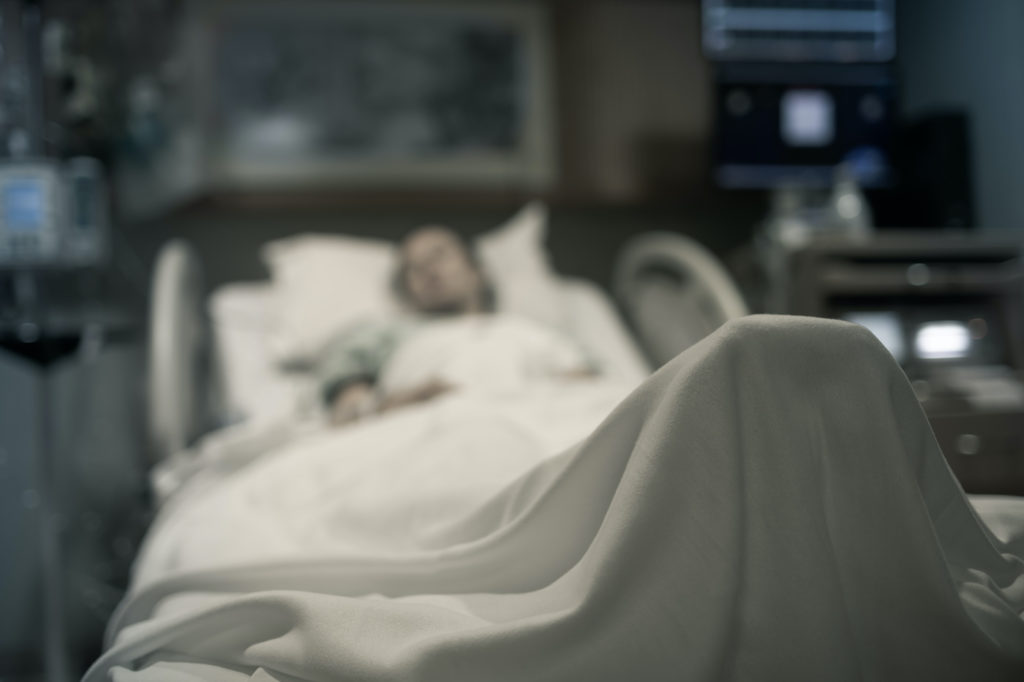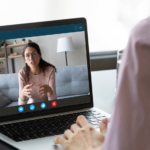We were discussing the care of one of our patients who was having some new trouble breathing. And then someone asked the question that made us all catch our own breath: should we be testing this patient for COVID-19?
We racked our brains for reasons not to test. The patient had come in with a surgical problem and had been in the hospital for more than a week. There was no report of her traveling anywhere prior to the surgery. She had not gotten out of bed to walk farther than the bathroom, so there was no way she had been exposed to another patient in the hospital directly. And there were no COVID-19-positive patients on that hospital floor.
But she had had visitors. In fact, over the weekend she had had several visitors. Our hospital policies have been changing steadily to try to stay abreast of this surge of infection, but at that time we still allowed some visitors, depending on the situation. Now our patient had a cough and was working so hard to breathe that we ended up having to put her on a ventilator. In just a few short hours, everything had changed for her.
The alarm bells sounded for us as well. We made a list of all the people who had been in this patient’s room that morning. The list was a page long, and not one of us had worn any kind of protective equipment. I thought about my own interactions with her, and then, with a knot growing in my stomach, I retraced the rest of my steps from the morning.
Start your day with Public Discourse
Sign up and get our daily essays sent straight to your inbox.I am an intern (a first-year resident physician) in General Surgery at the University of California hospital in San Diego, and we surgeons pride ourselves on our efficiency. In the span of the first few hours of my work day, I had already been in two of our Intensive Care Units (ICUs), the pre-operative work space, our resident work room, the Emergency Department, the locker room, and all of our patient rooms. I had come in direct contact with dozens of patients, colleagues, families, and staff. This pandemic has been a part of my life for several weeks now, yet it was only in that moment that it became real to me. I finally understood why and how this virus has so quickly become an international disaster.
As a first-year surgeon, my daily goals are to eat, sleep, take good care of my patients, and operate. The only goal that is non-negotiable is taking good care of my patients. It is the reason I chose a career as a medical doctor, and it is the reason I can at times set aside my own basic needs toward the goal Leon Kass defines as the end of medicine: the pursuit of the health of my patients.
The thought that I had possibly just exposed myself to a patient with COVID-19 suddenly challenged the way I had thus far continued to live my life. I am relatively young and healthy (despite my medical intern diet that is mostly sugar- and coffee-based). I live alone, and my older family members live far away. If I were to get sick—at the risk of sounding blasé—my attitude had previously been that I would only have myself to worry about. For that reason, perhaps I had fallen into the trap of thinking I could continue to live the way I had before, without worrying about my daily exposures in the hospital. But the possibility that I in turn had then exposed some of my most vulnerable patients to this virus hit below the belt. The thought of having to quarantine myself and leave our team short-staffed made for a particularly painful one-two punch.
As expressed in the Hippocratic Oath, which we so often reference as a basic moral framework for our medical decision-making, one of the promises every physician makes to his or her patients is the pledge to provide treatments for their benefit and not for their harm. One of the challenges in caring for our patients during this pandemic is that we are all wrestling with how to keep caring for them without exposing them to unnecessary risks. And so the extra moments we didn’t have in our work days are now filled with e-mails, texts, Zoom meetings, and conference calls. We go back and forth about which patients need to come in to clinic, which patients we can care for with tele-visits, and which patients need to be brought in to the hospital. We shuffle our schedules, cancel what we can, move our staff around, and try to protect our patients as well as ourselves.
The obvious challenge is that, despite our best efforts to be proactive, we are more often reacting, regrouping, and trying to stay afloat. I cannot help but feel that people like me have contributed to this by living with a sense of indifference until faced with the reality that personal changes must also be made. I had accepted the changes at work and the minor inconveniences, like having to wait in line to enter the grocery store, without embracing the need to evaluate much else about my life. I had not stopped to think about my own relationality. The fact that I work in a hospital had not yet translated in my mind into what changes I should be making to be sure I am not contributing to the spread of disease.
We are grappling for solutions as we continue to tread water in the battle with this virus. My heart goes out to my colleagues in the areas with the highest infection rates. I know how hard our teams are working here in San Diego, so I cannot imagine what they are going through in places like New York and Seattle.
What I do know is that despite, or perhaps as a result of, the heartache and unprecedented suffering during this pandemic, these times have also brought out the best in us. Within the hospital, the lines that divided us into specialties have started to blur. I chose to pursue training in General Surgery because I liked everything in medicine and wanted a job where I got to keep doing a little bit of everything in a very hands-on way. Over the course of the first few months of my intern year, I was saddened to see some of the turf battles that played out when multiple teams were involved in a patient’s care. We squabbled over trivialities, which I attribute largely to the increasing demands on our health-care system, and to the complexities of our medical insurance and legal system. Over the past few weeks, it has been refreshing to see the team spirit evoked by our unifying purpose. We are more flexible and more generous with each other, and we have been reminded during this otherwise dark time that we are at our best when we work together.
Outside of the hospital, the community has come together in beautiful ways that are creatively generous and still fully compliant with social distancing. Restaurants and coffee shops have offered doctors and nurses free meals and drinks. Several retail stores have started giving away merchandise; I have personally been offered a beautiful pair of expensive pants and multiple pairs of shoes. As touching as this outpouring of material offers has been, it has actually been almost a source of embarrassment, as I am doing the same job I was doing before, with the same intentions.
Spiritual offers abound as well. I was not able to livestream Pope Francis’s extraordinary Urbi et Orbi blessing as I was scrubbed in to a case in the operating room; but when I found a moment to watch the recording, I noted that the video had been watched three million times. Meditation apps and internet-based prayer groups have been formed. I have been able to submit prayer requests to dedicated online prayer teams and to livestream Mass with my local church.
In my neighborhood, there are threads in an internet-based communication format to offer food delivery and share resources. In my residency program, several attending physicians (our bosses) have reached out to make sure we have food at home and to check on our mental health. I have received words of encouragement and well-wishes from friends across the country, and my family members check in on me every day. This is the most connected I have been to my support system since I started residency last summer.
The future remains uncertain, and that is a bitter pill to swallow. Locally, we are anticipating a possible surge in numbers of disease-positive patients over the coming weeks. But we cannot give up hope; we must continue to fight the temptation to despair in the face of uncertainty. As we prepare for the worst and hope for the best, we have daily opportunities to make meaningful impacts on each other and on our communities. We have come together in a new way, and I suspect this will ultimately reshape the future landscapes of our medical practice and our health-care system. In the meantime, we are rethinking our standard practices and trying to grow better acquainted with expecting the unexpected.
As for my patient whom we tested for COVID-19, the result came back negative. We all breathed a sigh of relief, and I took a moment to thank God for my own health. I have never been more thankful to know that I can walk back into the hospital tomorrow, put on a fresh pair of scrubs, and keep taking care of my patients.













